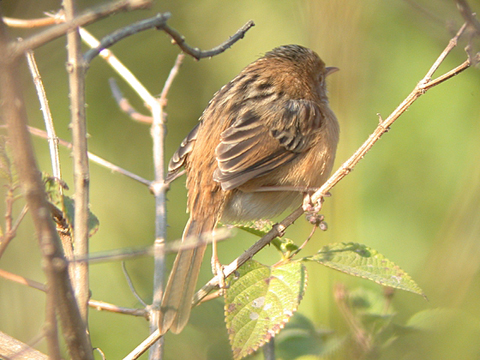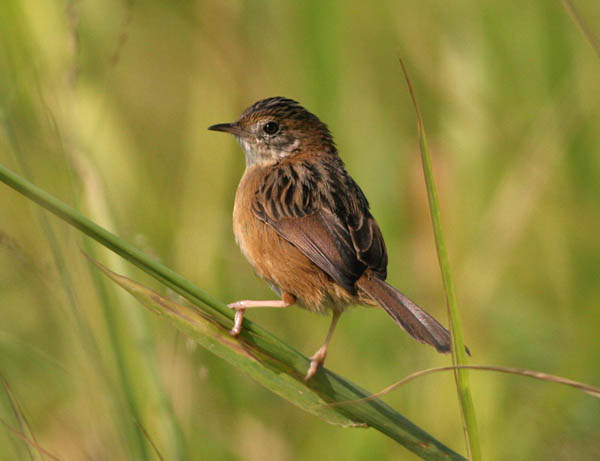 Author
Author |
Topic: Bright-Caped Cisticola (Read 1009 times) |
|
Kwok Jai
BBS Moderator
BBS Member
BBS Full Member
    

I love bird watching!
Gender: 
Posts: 40
|
 |
Bright-Caped Cisticola
« on: Dec 12th, 2005, 10:54pm » |
 Quote Quote  Modify Modify
|
Photo by Tam Yiu Leung
Bright-Caped Cisticola
11/12/2005
Kam Tin 錦田
#1

|
| « Last Edit: Dec 24th, 2005, 9:49am by Forrest FONG » |
 Logged Logged |
|
|
|
johnallcock
BBS Member
BBS Senior Member
   

Posts: 66
|
 |
Re: Bright-Caped Cisticola
« Reply #1 on: Dec 20th, 2005, 12:06pm » |
 Quote Quote  Modify Modify
|
I'm inclined to think this is a zitting cisticola, rather than bright-capped.
I find that the identification of cisticolas based only on views is tricky - they are very variable. Call is by far the easiest way to separate the two species.
In my opinion the following features of this bird point towards zitting:
The mantle and crown are rather brown, not contrasting much with the rump and nape. Bright-capped usually seems to be greyer on the mantle and crown.
The overall body tone (cheeks, nape, rump and flanks) is fairly buff. I find that bright-capped is richer in colour, more orange/rufous. The flanks especially seem darker than on this bird, and a front-on view of bright-capped shows strong contrast between the flanks and the pure white throat/belly.
The nape has some streaking. Bright-capped has an unmarked nape. I think bright-capped also has an unstreaked rump.
The tail is fairly short and brownish. Both species have longer tails in winter and this bird does not seem long enough for bright-capped (which can look almost prinia-like on a brief view). Also the tips of the tail feathers are paler (admittedly not white as in most zitting, but this seems to be fairly variable)
Finally, habitat and behaviour seems to be better for zitting, which is much commoner in lowlands (where bright-capped is rare; note though that zitting does also occur in upland areas) Bright-capped usually occurs in grassland, and is often quite skulking, except when calling from the tops of grass stems or bushes.
Incidentally, bright-capped does occur in the Kam Tin area, but I have only found it in one location, on the edge of the Lam Tsuen country park (behind Shui Mei village). Zitting occurs in small numbers around the Buffalo Fields and nearby agricultural areas.
|
|
 Logged Logged |
|
|
|
Yat-tung YU
BBS Member
BBS God
    

I love bird watching!
Gender: 
Posts: 133
|
 |
Re: Bright-Caped Cisticola
« Reply #2 on: Dec 20th, 2005, 3:20pm » |
 Quote Quote  Modify Modify
|
Dear John,
I would have different opinion than yours. I think it could still be a Bright-capped Cisticola.
Unfortnately the bird did not turn its face to the photographer and also it is impossible to know the call from the photo (!!). I agree these two are very important features.
However, the mantle and uppertail are shown very clear. Streaks on mantle are black in colour with strong contrast to the pale fringe - the pale one is buffish. It is not white. Please also see Pippen Ho's excellent photos on 4 Dec. Zitting Cisticola have black streaks with fringe in white and buff colour.
Uppertail of this Kam Tin bird show no white tip and Zitting Cisticola could show white tips on uppertail. I agree tail is not long of this bird. Also, my previous experience of this species in late November and early December also tell me that this species would have a long-tailed appearance. However, we do not have much experience of this species in the second half of the winter. I am lucky to see two birds in breeding plumage in March which had short tails and it is also cited in any literature. Therefore, it is reasonably to assume that the length of tail would become shorter in the course of winter.
Finally, Mr. Tam and Kwok Jai saw this bird exactly in the area you just mentioned!
Thanks for your interesting discussion.
Tung
|
| « Last Edit: Dec 20th, 2005, 3:22pm by Yat-tung YU » |
 Logged Logged |
|
|
|
johnallcock
BBS Member
BBS Senior Member
   

Posts: 66
|
 |
Re: Bright-Caped Cisticola
« Reply #3 on: Dec 21st, 2005, 3:23pm » |
 Quote Quote  Modify Modify
|
Tung,
You may be right. I keep looking back at the photo and still cannot convince myself 100% one way or the other!
I must admit that I am not familiar with the exact pattern of pale fringes on the mantle of the two species. I must remember to look closely next time I see one!
There does appear to be a strong eye-ring, the cheeks seem fairly plain, there is no dark subterminal tail-band and there is a contrast between belly and lower flanks, which suggest bright-capped.
However, I'm still slightly concerned about the nape streaking, pale tip to the tail (zitting does not always have white tips!) and the shortness of the tail. In early winter, with no wear to the feathers, it should currently be at it's maximum length!
Note that both species occur regularly in the location I mentioned, which makes identification even more confusing.
|
|
 Logged Logged |
|
|
|
Yat-tung YU
BBS Member
BBS God
    

I love bird watching!
Gender: 
Posts: 133
|
 |
Re: Bright-Caped Cisticola
« Reply #4 on: Dec 23rd, 2005, 1:02am » |
 Quote Quote  Modify Modify
|
What would this one be?   

Ma Tso Lung 馬草壟
18/12/2005
Canon 20D 400/5.6 ISO200
|
| « Last Edit: Dec 24th, 2005, 9:45am by Forrest FONG » |
 Logged Logged |
|
|
|
|
